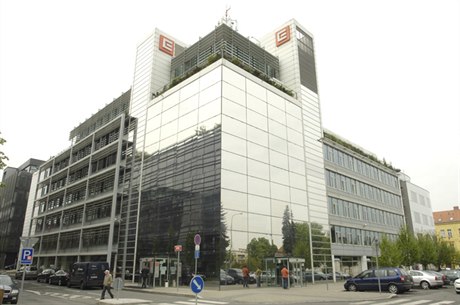Two selection procedures are being launched for three major Prague office complexes by state-controlled power giant ČEZ. While there is nothing unusual in that, some aspects of the selection process have raised speculation that one interested party is an investor close to ČEZ management who is pursuing the deal through an offshore company.
The offices in question are two building in Prague 4’s Duhová street where ČEZ has its headquarters and another building nearer the city center on Vinohradská street that is rented by insurer Všeobecná zdravotní pojišťovna (VZP).
“For ČEZ it’s clearly more efficient and cheaper to occupy rented offices. This gets rid of the need to deal with issues relating to the operation and upkeep of its own administrative buildings,” ČEZ spokesman Ladislav Kříž told the business daily E15, which broke the news of the sale.
ČEZ signed Czech real estate company and auction house Naxos to conduct the two-round selection of a buyer for both the Prague 4 and Vinohradská properties. The first round ends May 16 and the second kicks off the next day with bids required by May 26.
At first glance, the buildings would seem to be attractive to would-be buyers. But buyers could be deterred by procedural and other problems. One problem is a legal battle over Vinohradská complex’s ownership dating to 2006.
Hefty deposits
Some procedural issues could thin out the ranks of interested investors. To start with, each potential buyer must purchase the offer details for Kč 10,000. If you want to view the building, that comes with a Kč 5.0 million deposit that also gives access to the data room. “Documents in the data room can be continually updated,” according to the statement accompanying the announcement of the sale launch. This means key details for a buyer could change up to the last minute.
One key detail for the sale of such office buildings is the nature of the rental agreements with tenants and the character of those tenants. Clearly, ČEZ and VZP are prestigious tenants, and the details of their agreements should be in the data room. But if these are susceptible to ongoing updates, then investors could be cautious. ‘The demand for deposits could be counterproductive since it discourages large institutional investors.’
Every investor wanting to get to the second round must also come up with deposit payments for each sale. For the Prague 4 buildings the total is Kč 60 million, while half that amount is demanded for the Vinohradská property. Real estate experts approached by Czech Position said the deposits are quite steep, especially since they could be forfeited under certain circumstances, such as if the winner does not pay up in time or sign the contract documents. “For a strong investor, the payments should not pose a problem,” one expert said.
But deposits are not usually run of the mill for international property sales but instead apply to voluntary or involuntary auctions. International funds are often active in the former case and do not usually have to prove their worth. “With them, there is a minimal risk that they would withdraw from the purchase. But the demand for deposits could be counterproductive since it discourages large institutional investors,” said Zdeněk Špaček of the international department of real estate company King Sturge.
For many funds the chance that deposits could be forfeited is enough to make them stay away from the sale altogether, Špaček warns. “During due diligence it is possible that problems that are so big surface that the investor turns his back on the purchase. For this reason deposits are unacceptable for most fund managers, who are managing other investors’ money. In the case of some major properties this can reduce the number of possible buyers,” he said.
Apart from the deposits, the only criterion for bidding is that participants must be able to acquire property in the Czech Republic. King Sturge says such competitions usually require further proof. “Interested parties must show that they have experience in investing in such commercial properties and enough resources to make the purchase,” Špaček said. The origin of the cash should also be demonstrated and, if the purchase is based on a bank loan, the willingness of the lender to provide it for purchase of a property. Nothing of this sort, however, is included in the announcement of the invitation for offers.
A question of ownership
The potential buyers at Vinohradská would also be wise to delve into the details of an ownership dispute concerning the property. On the one side of that battle are the ČEZ companies responsible for property management and distribution, together with the former Central Bohemia distribution company (SČE), Prague Municipal Court spokesman Martina Lhotáková told Czech Position. The complainant, Roman Minárik, is seeking to annul decisions and agreements cleared at the company general meeting in 2006. ‘Someone who has information from the court and can guess how the case will turn out can take a risk.’
The Municipal Court halted proceedings in the case and was backed up in this decision by the High Court, but Minárik has sought permission to take the matter to the Supreme Court. And the ongoing dispute could be a major deterrent to investors. “A property where ownership is contested will not be bought by any institutional investor. On the other hand, someone who has information from the court and can guess how the case will turn out can take a risk and go for it,” a source told Czech Position.
Naxos commercial director Libor Nevšímal prefers to put a more positive spin on the situation. “It’s difficult to estimate how much the legal battle will influence the sale. For some interested parties it could mean that they disqualify themselves, but for others it might not be a hurdle at all,” he said.
Naxos says that the terms of the sale were fixed in advance with the seller, ČEZ, with it taking the lead on some procedural issues and some questions being taken for granted. Naxos says it will seek possible buyers on the basis of public relations, current advertising and relations with investors. The overriding issue determining the future owner or owners will be the purchase price, it adds. ‘I would expect the buildings to be sold for a fairly low price … because of the uncertainty facing investors.’
Some sources say that price could well be low. “I would expect the buildings to be sold for a fairly low price … because of the uncertainty facing investors such as the conditions being open to alteration in the first round and the complications of finding financing,” one well-informed source told Czech Position.
That would probably suit one group of investors who, according to Czech Position sources, have a very serious interest on being the future owners of the properties. They are a group of investors close to the current ČEZ management who, if successful, will lodge ownership in their offshore company. According to the sale calendar, the identity of the unknown offshore investor could be known by the end of May.





